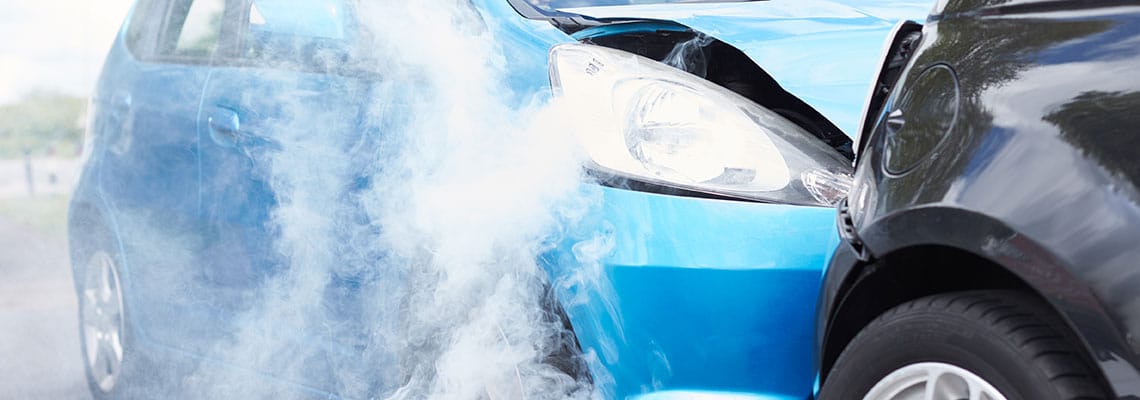Managing the aftermath of a car accident is never easy. In some ways, it’s even trickier when the accident wasn’t your fault. In these situations, you not only have to deal with your own insurance company, but you also have to deal with the hassle of contacting the at-fault driver’s insurance provider.
Knowing what to do when an accident is someone else’s fault can ultimately cut down on this hassle.
How to Handle a Car Accident That’s Not Your Fault
Keep in mind that the at-fault party may not report the accident; and if they do report it, they may make false statements that shift the blame to you. As such, it is important to follow a few basic steps to protect your interests. Here are some general recommendations for what to do if you are involved in an accident that wasn’t your fault.
Immediately After the Crash
Immediately after the accident, make sure the parties involved (including yourself) are alright. If not, call for medical attention. Typically, it is best to get a medical evaluation even if you do not think you have been injured, just to verify that you do not have any latent or invisible injuries. If there are other parties who have been injured, it is recommended that you not attempt to move them, unless the situation necessitates it. Instead, call for an ambulance.
Collect Information
If the other driver was clearly at fault, it is their job to report the accident. However, this doesn’t always happen, and you may need to furnish evidence to prove what happened. As such, it is important to gather some evidence at the scene of the crash.
Some specific examples of evidence to collect:
- The at-fault driver’s name, address, and driver’s license number
- The at-fault driver’s insurance company and policy number
- The name and contact information of any witness(es) present, along with a brief statement
- Pictures of the accident scene (the more the better), demonstrating the damage as well as the at-fault driver’s license plate number
Call the Police
You should always call the police to file a report, regardless of how serious the accident is. An official police report can help you to hold the other driver accountable.
Make Your Own Record
Assuming you don’t have serious injuries, head home and write down your own account of what happened. It is important to make your own written record so that you can remember the event clearly.
Inform Your Insurance Company
Nobody likes dealing with insurance companies, but it is an important step in the auto accident process. Call your company as soon as you can after the accident, letting them know what happened.
It is important to remember that car accidents happen so quickly that it’s often hard to know exactly what transpired; it may turn out that you were partially to blame, and thus your insurance company may be involved in processing claims. Additionally, the at-fault driver may have an insurance policy that does not cover victims.
Finally, note that if it turns out that the other driver was fully to blame, your insurance company will need to contest treatment and vehicle repair expenses with the other party’s insurer.
Get a Lawyer
You may also determine that you need to sue the at-fault driver’s insurance company in order to get the compensation you require. If that is the case, then you’ll want to find a qualified car accident attorney in your area.
Note that the at-fault driver’s insurance company is supposed to pay for your medical treatments, vehicle repairs, and other expenses related to the collision. However, insurance companies are notorious for finding ways to deny or undervalue claims. If you feel like the at-fault insurance company isn’t playing fair, you are well within your rights to hire a personal injury lawyer to sue the insurance company on your behalf.
Frequently Asked Questions
What if you total your car, but it wasn’t your fault?
If the other driver causes an accident that completely ruins your vehicle, they will need to pay for the full cost of the vehicle. Basically, the insurance company will need to pay the cost of a replacement vehicle minus depreciation.
Who pays your deductible in the event of a no-fault accident?
In a no-fault accident claim, the other party’s insurance company should be responsible for paying your deductible. However, processing claims can take a long time, and in some cases, you may need to pay the deductible yourself and then seek reimbursement.
What if you become injured in an accident where you were not at fault?
You can seek compensation for any treatments you need as the result of auto accident injuries. If the cost of your medical care exceeds the value of the at-fault driver’s policy, then you may need to use your uninsured driver’s insurance to cover the rest.
Get Help with Your No-Fault Car Accident Case
If you have been involved in an accident that was not your fault, and if you are ready to pursue legal action to ensure adequate compensation, we recommend seeking an experienced personal injury lawyer. If you live in Texas, consider the car accident attorneys at McLaurin Law. Contact our firm to set up a consultation with us.



